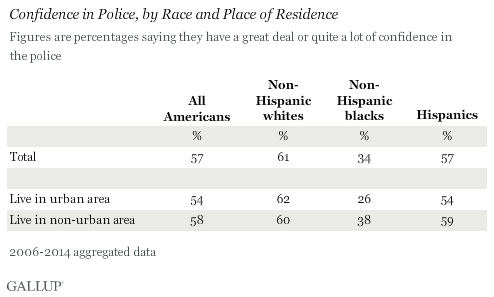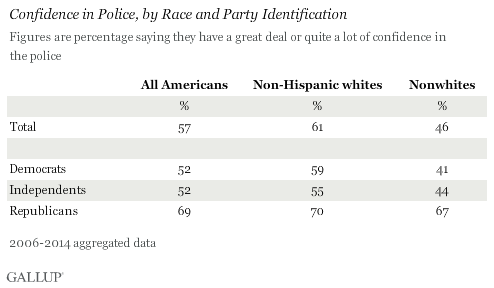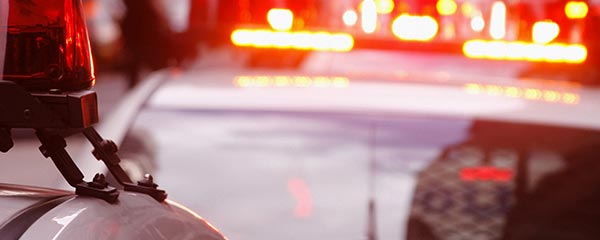PRINCETON, N.J. -- As controversy continues to swirl about police officers' treatment of blacks, an analysis of Gallup data underscores how much less likely U.S. blacks are than whites or Hispanics to express confidence in the police. The analysis also reveals that blacks living in urban areas are significantly less likely than blacks in non-urban areas to say they are confident in the police.

The results are based on aggregated data from Gallup's 2006 through 2014 annual updates on confidence in major U.S. institutions. Over this time, an average of 57% of Americans have said they have "a great deal" or "quite a lot" of confidence in the police, typically placing it near the top of the list of institutions. This includes confidence ratings of 61% among whites and 57% among Hispanics, but just 34% among blacks.
Racial differences in views of the police are long-standing, but have been brought to the forefront again after white police officers' actions resulted in the deaths of black men in Ferguson, Missouri, and Staten Island, New York. Grand juries did not indict either officer.
Blacks living in highly urban areas are even less likely to have confidence in the police, 26%, than those living in non-urban areas (38%). For this analysis, urban residents are those living in the 47 U.S. counties that include the nation's largest cities, using the definition of "Big Cities" from the American Communities Project and the American University School of Public Affairs. These counties are highly urban and include a high proportion of racial and ethnic minorities. About one in three blacks nationwide live in these highly urban counties.
Because many of the high-profile racial incidents involving police have occurred in urban settings, blacks living in and around big cities may be more sensitive to these tensions with police than blacks living in non-urban areas. It is possible that these high-profile events were not isolated incidents but more extreme examples of ongoing and widespread tensions between police and blacks, which many urban blacks may experience firsthand.
Although blacks' views of police vary depending on where they live, there is little meaningful difference in the views of whites or Hispanics living in urban versus non-urban areas.
Democrats Less Confident in Police
While race clearly influences how Americans view the police, the public's political leanings also have an effect. Republicans have significantly more confidence in the police than do Democrats or independents, and these political differences are apparent among white and nonwhite Americans. Race and politics interact such that nonwhite Democrats and independents have far less confidence in police than Republicans of any race, or than Democrats and independents who are white.

Democrats' tendency to view matters of race and racism as a greater priority for government may help explain these political differences.
Implications
Tensions between blacks and police officers have been an unfortunate but not uncommon issue in the U.S. for decades. These tensions have resulted from a wide-ranging set of historical and contemporary factors that have been the subject of much debate.
Blacks, particularly those living in urban areas, view the police much less positively than whites do. In addition to the basic confidence-in-institutions data reported here, Gallup has also shown racial differences in other attitudes about police, including a report last month showing large and consistent racial differences over time in a separate question that asked about Americans' confidence in the police to protect them from violent crime, specifically. Most blacks also believe the U.S. justice system more broadly is biased against blacks.
Whites and blacks have divergent attitudes in many other areas, particularly matters that touch on race, including racial equality and opportunity. Thus, one reason for blacks' more negative views of police may be that they evaluate the police against the backdrop of real or perceived unequal treatment of their race, while racial sensitivities do not come into play when other Americans evaluate the police.
Survey Methods
Results for this Gallup poll are based on aggregated telephone interviews conducted from 2006-2014, with a random sample of 9,442 adults, aged 18 and older, living in all 50 U.S. states and the District of Columbia. For results based on the total sample of national adults, the margin of sampling error is ±1 percentage point at the 95% confidence level.
For results based on the total sample of 7,671 whites, the margin of sampling error is ±1 percentage point at the 95% confidence level.
For results based on the total sample of 730 blacks, the margin of sampling error is ±4 percentage points at the 95% confidence level.
For results based on the total sample of 568 Hispanics, the margin of sampling error is ±5 percentage points at the 95% confidence level.
Each sample of national adults includes a minimum quota of 50% cellphone respondents and 50% landline respondents, with additional minimum quotas by time zone within region. Landline and cellular telephone numbers are selected using random-digit-dial methods.
Learn more about how Gallup Poll Social Series works.

